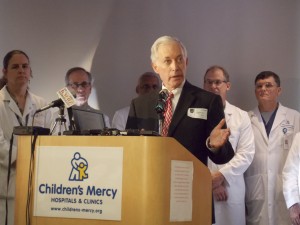By JOSHUA PHILLIPS
Northeast News
August 14, 2013

Healthcare organizations in Kansas City, Mo., are hoping to have a new proposal on the election ballot this November.
Children’s Mercy Hospital, University of Missouri-Kansas City (UMKC), Saint Luke’s Health System and the Kansas City Area Life Sciences Institute (KCALSI) are partnering together to start a world-class translational medical research institute that would lead to the diagnosis, prevention, treatment and curing of diseases. The four organizations held a press conference at Children’s Mercy Aug. 8 to explain and discuss the next steps of this proposal.
“This is a big day for the entire region of Kansas City and Jackson County,” said Patrick James, senior medical director of the KCALSI. “The trajectory for life sciences in the Kansas City area has been tremendous in the last 15 years and this proposal can continue that trajectory.”
Translational research is defined as “the critical phase or the discovery and development of disease cures that occurs between the microscope and the marketplace, or that follows the birth of a basic scientific discovery made in the laboratory but precedes the clinical trial phase of a new therapy,” according to the Memorandum of Understanding between the four organizations. The proposed institute would be named the Jackson County Institute for Translational Medicine.
In order for Jackson County citizens to vote on the proposal, the four organizations need the Jackson County legislature to approve placing the initiative on the election ballot for November. To make the Jackson County Institute for Translational Medicine a reality, voters would need to approve a half-cent sales tax for Jackson County that would raise an estimated $40 million a year in collaborative funding.
This funding would be split among the four organizations with 50 percent allotted to Children’s Mercy, 20 percent to St. Luke’s, 20 percent to UMKC and 10 percent in supportive grants. The half-cent sales tax would sunset in 20 years.
UMKC Chancellor Leo Morton said the initiative would help bring world-class doctors to Kansas City and allow for medical students to study medicine and later have a lasting career in Kansas City.
“Nationally, healthcare has accounted for 13 percent of total job growth in major metro areas over the course of the employment recovery. In 11 metro areas that span every major U.S. region, healthcare has accounted for more than 25 percent of that job growth,” according to the Healthcare Metro Monitor Supplement Report from July 1.
Supporters of the initiative said establishing an institute could also attract new businesses and create new jobs, spending and tax revenues.
Dr. John Spertus, clinical director of outcomes research at Saint Luke’s Mid America Heart Institute, said one of the benefits of improving translational research is engaging patients in shared decision-making as well as recruiting the best in the nation to come to Kansas City.
“The outcomes and translational research that is done in cardiology in Kansas City is widely recognized as amongst the best in the world,” Spertus said. “If the community invests in translational and outcomes research, it will enhance Kansas City’s ability to recruit the best and brightest talents in the country and around the world.”

















